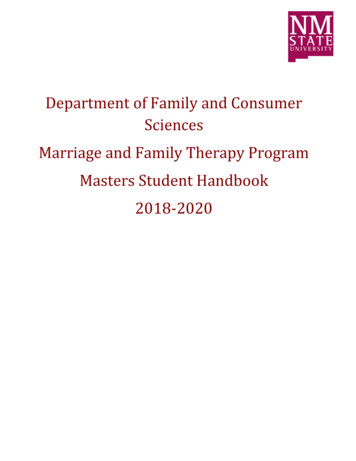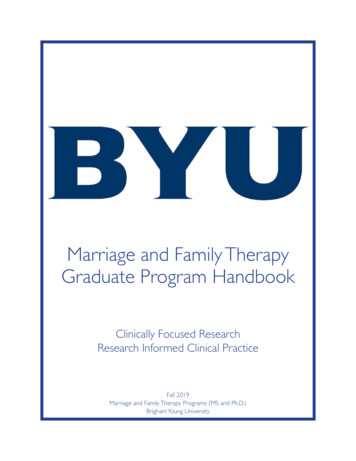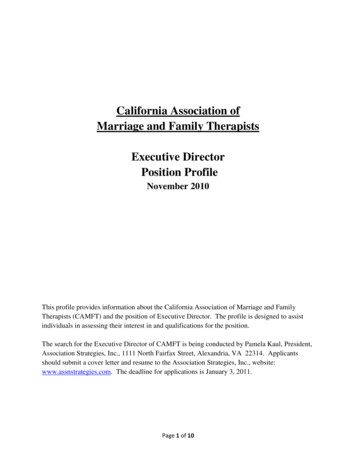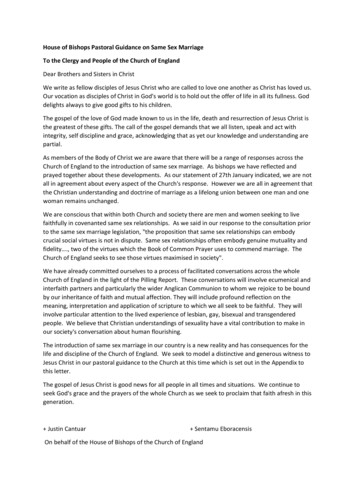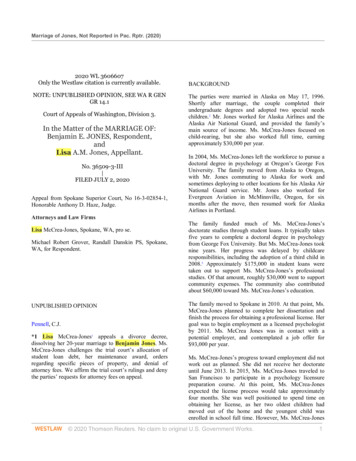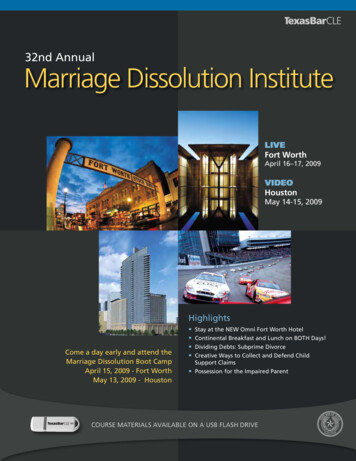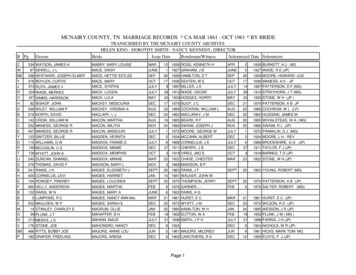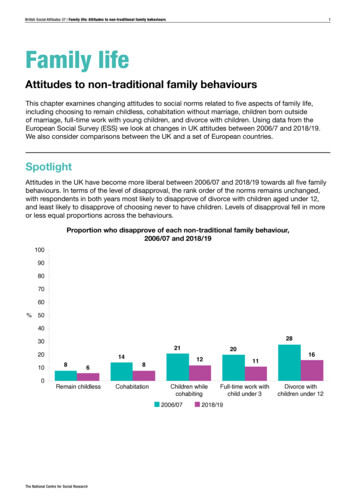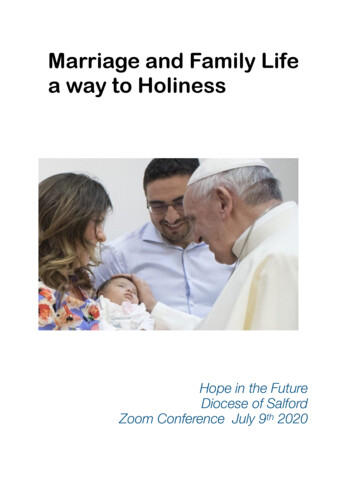
Transcription
Marriage and Family Lifea way to HolinessHope in the FutureDiocese of SalfordZoom Conference July 9th 2020
This Conference was first held In the Diocese ofShrewsbury, The Spring Talk IV conducted by Patty andDamian Ganley, and Anne and Konrad Ostmeier with FrBryan Cunningham. Patty and Damian, Anne andKonrad are members of the Schoenstatt Family. Theyare involved in Marriage Preparation, MarriageEnrichment and the Development of the Spirituality ofMarriage and Family Life.ContactsPatty & Damian pattyganley@hotmail.com Konrad & AnneFr Bryan ostmeieranne@gmail.com KWAOST1@aol.com fr.bryan@schoenstatt.org.uk
Opening PrayerGod of my life,Help me to take my hand off the wheel and allow you to takeover. Let my friendship with you be my passion. My abilitybelongs to you and where I am weak you work all the more.May I be a reflection of you. Give me anew the freedom to dowhat pleases you. I am certain that you will give me morethan I ever expected. Amen.Mother Mary,In your life we see that it is worth trusting God completely!In you we find the strength to unite our lives with Him and oneanother. Our covenant with you encourages us to give our all:My Queen, My Mother, I give myself entirely to you: my eyes,my ears, my mouth, my heart, myself without reserve. As Iam your own, my good mother, guard and defend me asyour property and possession. Amen.Apostles’ PrayerIntroductionFollowing the WayWe look at Marriage and family life in the context of theuniversal call to holiness‘Good Soil Church’Albert Wiseman working with Gallup Press wrote about thechanges in Churches and Church in a book from 2007 called:Growing an Engaged Church, How to stop ‘doing Church’ andstart ‘being Church’ again. He brings the notion of being a‘Good Soil Church’ in reference to the parable of the sower(Matt 13). His studies show three basic groups of Churchmembers: engaged, not-engaged and actively disengaged.
Gallup research demonstrates that congregations withengaged members are spiritually healthier, are better able tocarry out their missions, attract more new people, are betterable to fund new ventures, and have a higher percentage ofspiritually committed Individuals. In short, they are moreeffective than congregations with not-engaged or activelydisengaged members.He unearths four outcomes that are performance indicatorsfor a Church which is spiritually growing. These are; lifesatisfaction, inviting, serving and givingHe discovered that causes of spiritual health in a communityare spiritual commitment and Congregational engagement.Wiseman points out that people want to feel valued and wantto know that they make a meaningful contribution to thecommunity. This is the gateway to becoming engaged, feelingyou belong and knowing you are useful in your community. Toa certain extent Wiseman wishes to ‘ reclaim the Biblicalheritage of the Church found in the Acts of the Apostles (Acts2:42- 47): a growing community of followers of Christ who werepassionate about the message and mission of the newmovement, who practiced radical hospitality, and who were soemotionally engaged with the movement that they were willingto risk everything to see it succeed.”We can propose that good-soil-church resonates well withthe ‘spiritual growth of healthy family life.‘Family the untapped resource ’Mavis Pirola was the only woman along with her husband Ronwho attended the first Synod on the family in 1980 and in hershort address to the Synod she remarked that ‘family was theuntapped resource ofevangelisation in the Church’.That synod highlighted thefamily has the missioncorresponding to its nature tobecome a community of lifeand love, as such to be theplace of forming a community of
persons based on the fundamental communion betweenhusband and wife. Pope Francis has instigated a revitalisationof the Church’s approach to the spirituality and pastoralsignificance of the family.Role of Marriage and Family in forming Christian CultureFrom Familiaris Consortio we hear:Christian spouses and parents can and should offer theirunique and irreplaceable contribution to the elaboration of anauthentic evangelical discernment in the various situationsand cultures in which men and women live their marriage andtheir family life. They are qualified for this role by their charismor specific gift, the gift of the sacrament of matrimonyFamiliaris Consortio #5Thus, with love as its point of departure and making constantreference to it, the recent Synod emphasised four generaltasks for the family:1) forming a community of persons;2) serving life;3) participating in the development of society;4) sharing in the life and mission of the Church.Familiaris Consortio#17But man, who has been called to live God's wise and lovingdesign in a responsible manner, is an historical being who dayby day builds himself up through his many free decisions; andso he knows, loves and accomplishes moral good by stagesof growth. Familiaris Consortio # 34In a conference with Forum for Family Associations PopeFrancis said:“The family, which you promote in various ways, is at thecentre of God’s plan, as shown in the whole history ofsalvation. For a mysterious divine plan, the complementarityand love between man and woman make them co-workers ofthe Creator, Who entrusts them with the task of generatingnew creatures to life, taking care of their growth andeducation. The love of Jesus for children, His filial relationshipwith the heavenly Father, His defence of the conjugal bond,
which He declares sacred and indissoluble, fully reveal theplace of the family in God’s plan: being the cradle of life andthe first place of acceptance and love, it has an essential rolein the vocation of man, and it is like a window that opens upon the mystery of God Himself, Who is Love in the unity andtrinity of Persons.”(Audience with Delegation of Forum of Family Associations JUNE 16, 2018)Holiness for everyone for everydayHoliness means being yourselfPope Francis offers us many examples of holy livesthroughout this document: St. Thérèse of Lisieux, the FrenchCarmelite who found holiness in doing small tasks; St.Ignatius of Loyola, the Jesuit founder who sought to find Godin all things; St. Philip Neri, the founder of the Oratorians whowas renowned for his sense of humour.The saints pray for us and give us examples of how to live,but we are not meant to be cookie-cutter versions of them.We are meant to be ourselves, and each believer is meant to“discern his or her our own path” and “bring out the very bestof themselves.” As Thomas Merton said, “For me to be a saintmeans to be myself.”
Everyday life can lead to holinessYou do not need to be a bishop, a priest or a member of areligious order to be holy. Everyone is called to be a saint, asthe Second Vatican Council reminded us—a mother or afather, a student or an attorney, a teacher or a janitor. “Saintsnext door,” Francis calls them. All we need to do is to “live ourlives in love” and “bear witness” to God in all we do. That alsodoesn’t have to mean big, dramatic actions. Francis offersexamples of everyday sanctity, like a loving parent raising achild; as well as “small gestures” and sacrifices that one canmake, like deciding not to pass on gossip. If you can see yourown life as a “mission,” then you soon realise that you cansimply be loving and kind to move towards holiness.You also do not have to be “swooning in mystic rapture” to bea saint or walking around with “lowered eyes.” Nor do youhave to withdraw from other people. On the other hand, youdo not want to be caught up in the “rat race” of rushing fromone thing to another. A balance between action andcontemplation is essential.Tendencies to avoidPope Francis may send people racing to either dictionaries ortheir theology textbooks when asks us to avoid two dangersin the spiritual life.The first is Gnosticism, from the Greek word gnosis, to know.Gnosticism is the old heresy that says that what matters mostis what you know. No need to be charitable or do good works.All you need is the correct intellectual approach. TodayGnosticism tempts people to think that they can make thefaith “entirely comprehensible” and leads them to want toforce others to adopt their way of thinking. “When somebodyhas an answer for every question,” says Francis, “it’s a signthat they are not on the right path.” In other words, being aknow-it-all is not going to save you.The second thing to avoid is Pelagianism, named for Pelagius,the fifth-century theologian associated with this idea.Pelagianism says that we can take care of our salvationthrough our own efforts. Pelagians trust in their own powers,
don’t feel like they need God’s grace and act superior toothers because they observe certain rules.Today’s Pelagians often have, the pope says, “an obsessionwith the law, an absorption with social and politicaladvantages, punctilious concern for the church’s liturgy,doctrine and prestige.” It’s a real danger to holiness becauseit robs us of humility, sets us over others, and leaves littleroom for grace.Be kind“Gaudete et Exsulatate” is filled with Pope Francis’ trademarkpractical advice for living a life of holiness. For example, don’tgossip, stop judging and, most important, stop being cruel.That goes for online actions, too. Francis’ comments on thistopic are memorable. Online, he writes, “defamation andslander can become commonplace.since things can be saidthere that would be unacceptable in public discourse, aspeople look to compensate for their own discontent bylashing out at others. In claiming to uphold othercommandments, they completely ignore the eighth, whichforbids bearing false witness or lying and ruthlessly vilifyingothers.”The Beatitudes are a roadmap to holinessAs you might guess from the document’s title, the Beatitudes,Jesus’ list of “blessed ares,” are central to this exhortation.The Beatitudes are not only what Jesus means by holiness,they are also a portrait of our Lord himself. So we’re called tobe poor in spirit, meek, peacemakers, to hunger and thirst forrighteousness, and so on.But let me focus on one beatitude: “Blessed are the merciful.”Pope Francis says mercy, one of the central themes of hispapacy, has two aspects: helping and serving others but alsoforgiving and understanding. Jesus does not say, “Blessed arethose who plot revenge!” And what is Pope Francis’ overallsummary of holiness? It’s based on the Beatitudes: “Seeingand acting with mercy.”
Family is Sacred IntroductionSpirituality of 1000 small gesturesIn Amoris Laetitia Pope Francis shows how family is theschool of engagement. The place were we experience andlearn human networking, personal bonds in the cultural fabricof ‘The spirituality of family love (which) is made up ofthousands of small but real gestures. In thatvariety of gifts and encounters which deepen communion,God has his dwelling place. AL #315-316Holiness the Family wayWe have always spoken of how God dwells in the hearts ofthose living in his grace. Today we can add that the Trinity ispresent in the temple of marital communion. Just as Goddwells in the praises of his people (cf. Ps 22:3), so he dwellsdeep within the marital love that gives him glory. (AL 314)The Lord’s presence dwells in real and concrete families, withall their daily troubles and struggles, joys and hopes. Living ina family makes it hard for us to feign or lie; we cannot hidebehind a mask. If that authenticity is inspired by love, then theLord reigns there, with his joy and his peace. The spirituality offamily love is made up of thousands of small but real gestures.In that variety of gifts and encounters which deepencommunion, God has his dwelling place. This mutual concern“brings together the human and the divine”, for it is filled withthe love of God. In the end, marital spirituality is a spiritualityof the bond, in which divine love dwells. (Al 315)FamilySchool of Life“I thank God that many families, which are far fromconsidering themselves perfect, live in love, fulfil their callingand keep moving forward, even if they fall many times alongthe way. The Synod’s reflections show us that there is nostereotype of the ideal family, but rather a challenging mosaicmade up of many different realities, with all their joys, hopesand problems.” (AL57)
(Family) is the path along which the history of salvationprogresses. The triune God is a communion of love, and thefamily is its living reflection. (cf AL11) The aim of Churchteaching is “to present marriage more as a dynamic path topersonal development and fulfilment than as a lifelongburden” (AL 37).If the parents are in some sense the foundations of the home,the children are like the “living stones” of the family (cf. 1 Pet2:5). (AL12)Here too, we can see another aspect of the family. We knowthat the New Testament speaks of “churches that meet inhomes”. A family’s living space could turn into a domesticchurch, a setting for the Eucharist, the presence of Christseated at its table. (AL15)School of LoveAll that has been said so far would be insufficient to expressthe Gospel of marriage and the family, were we not also tospeak of love. For we cannot encourage a path of fidelity and
mutual self-giving without encouraging the growth,strengthening and deepening of conjugal and family love.Indeed, the grace of the sacrament of marriage is intendedbefore all else “to perfect the couple’s love”. (AL 89)“Love is shown more by deeds than by words”Throughout the text (of 1Cor 13), it is clear that Paul wants tostress that love is more than a mere feeling. Rather, it shouldbe understood along the lines of the Hebrew verb “to love”; itis “to do good”. As Saint Ignatius of Loyola said, “Love isshown more by deeds than by words”.(Spiritual Exercises, Contemplation to Attain Love (230)106 (AL 94)Spiritually, Father Kentenich said “Two hearts one beat”. Hewas referring to the relationship of Mary with her Son, Jesus.However all love is about having a right of residence in theheart of the one I lov
Everyday life can lead to holiness You do not need to be a bishop, a priest or a member of a religious order to be holy. Everyone is called to be a saint, as the Second Vatican Council reminded us—a mother or a father, a student or an attorney, a teacher or a janitor. “Saints next door,” Francis calls them. All we need to do is to “live our
